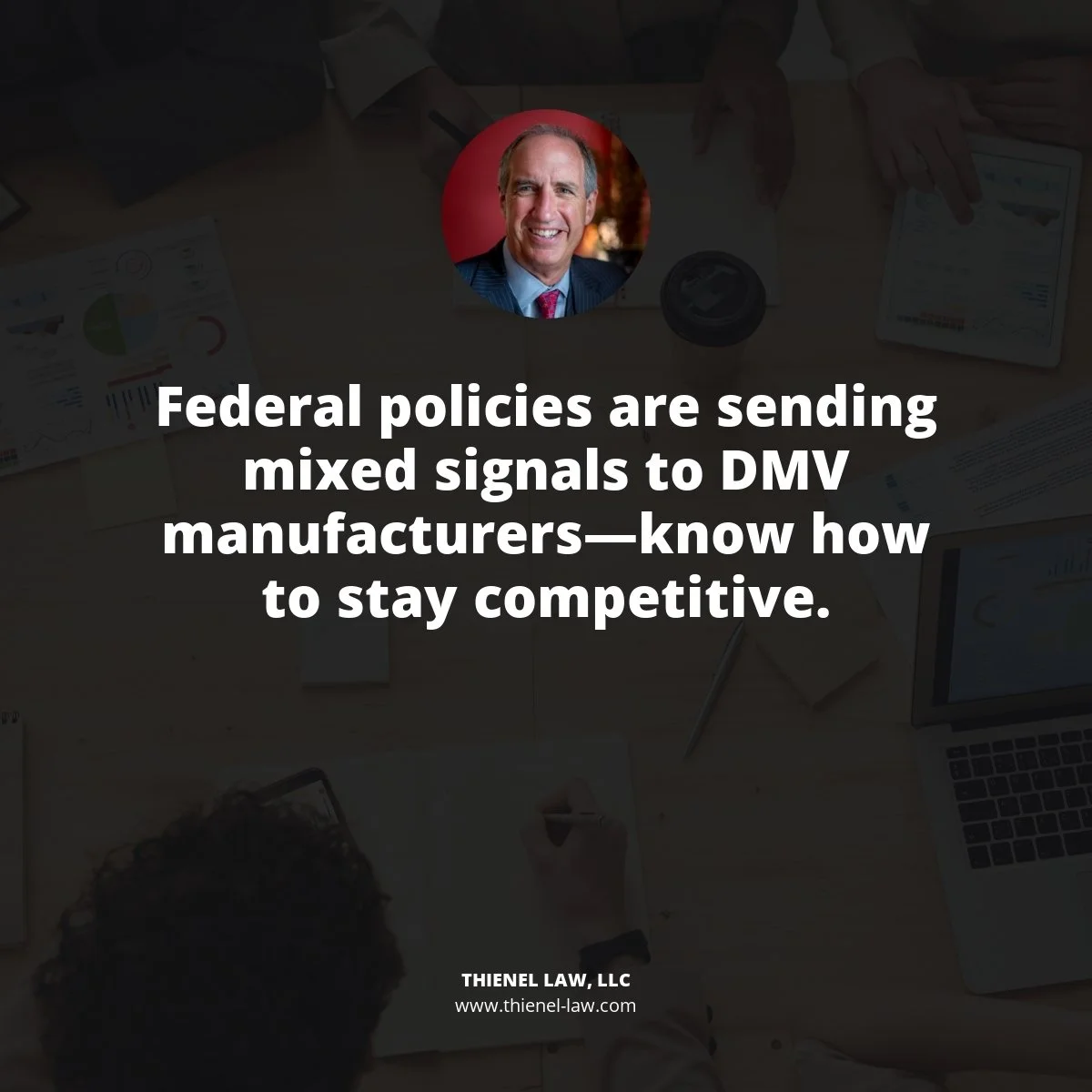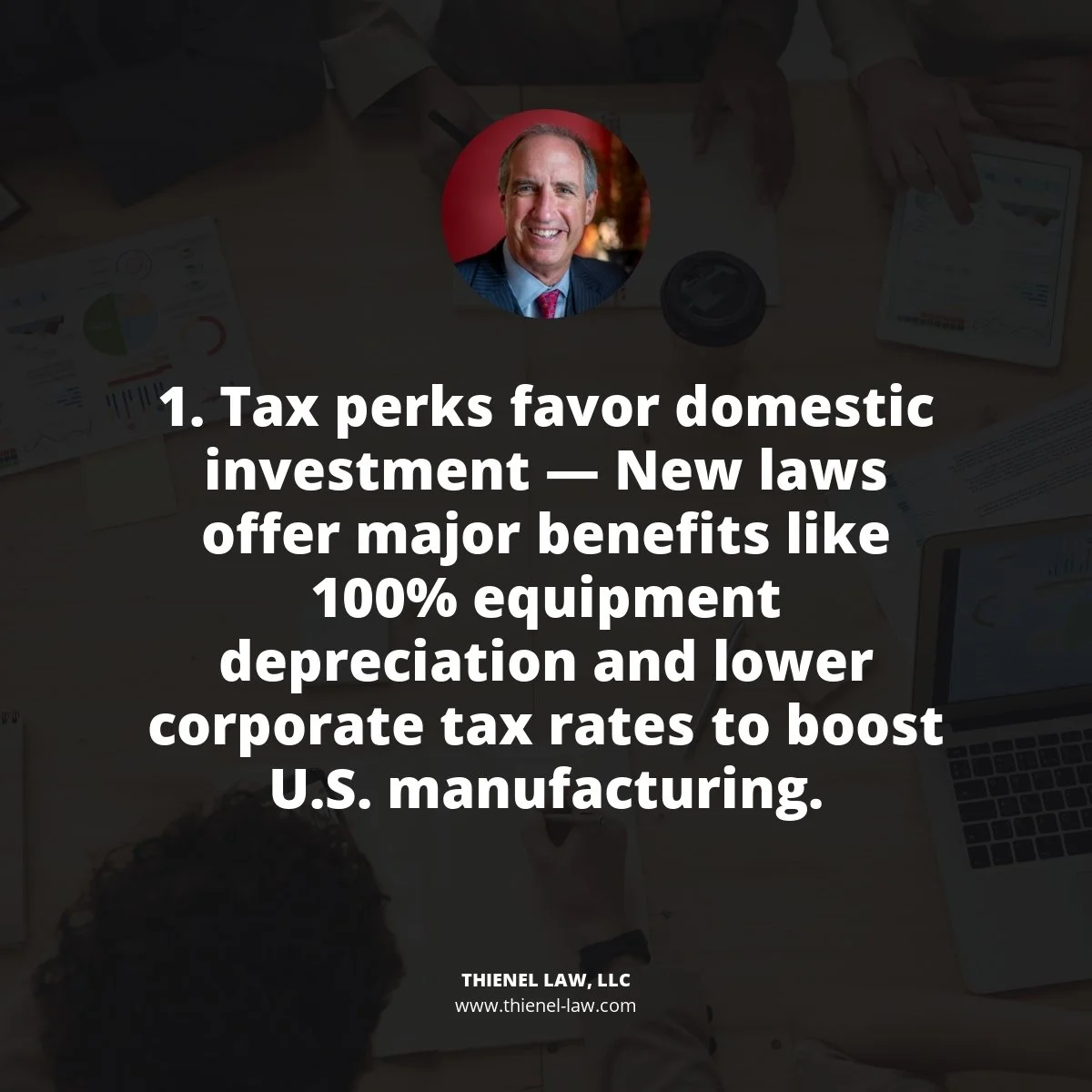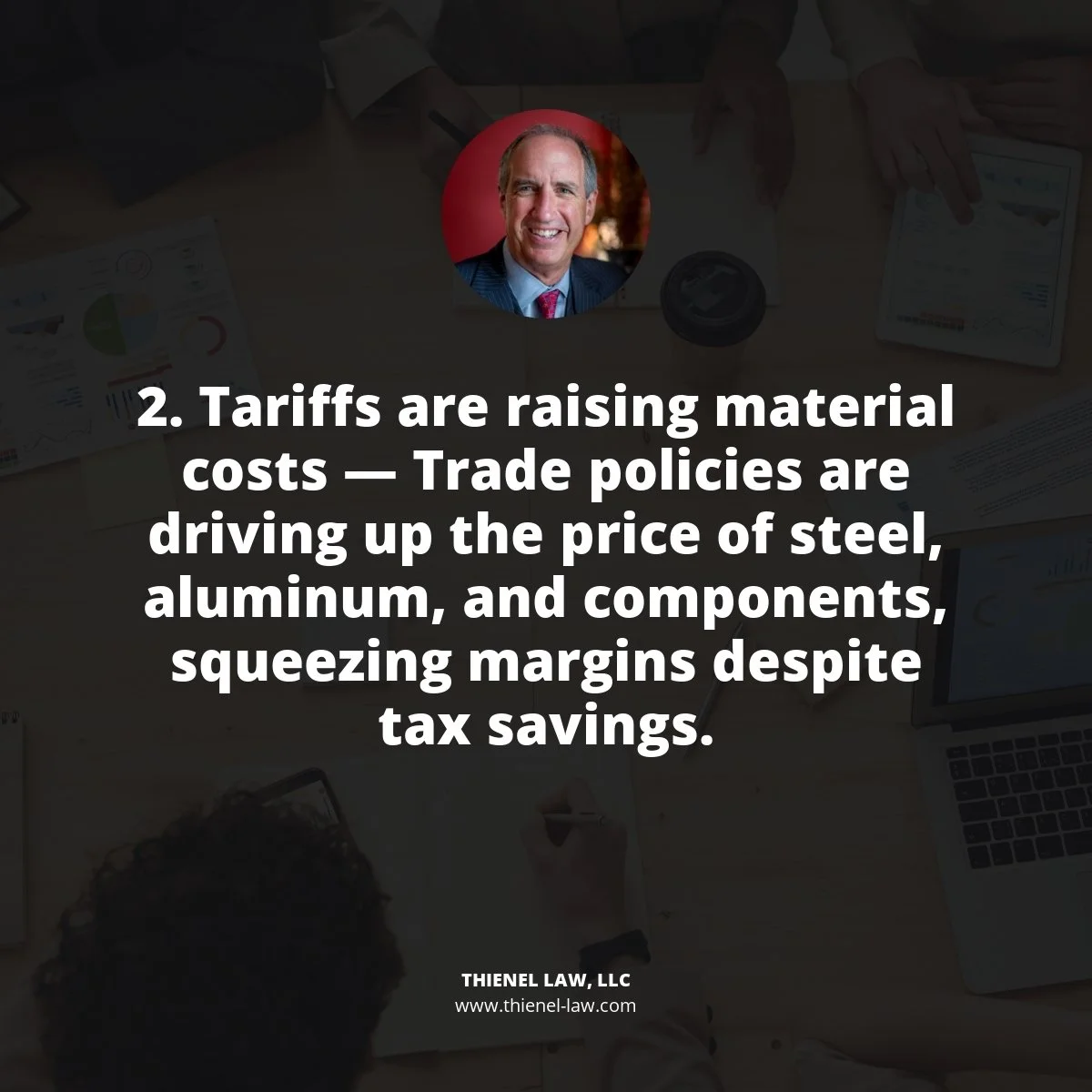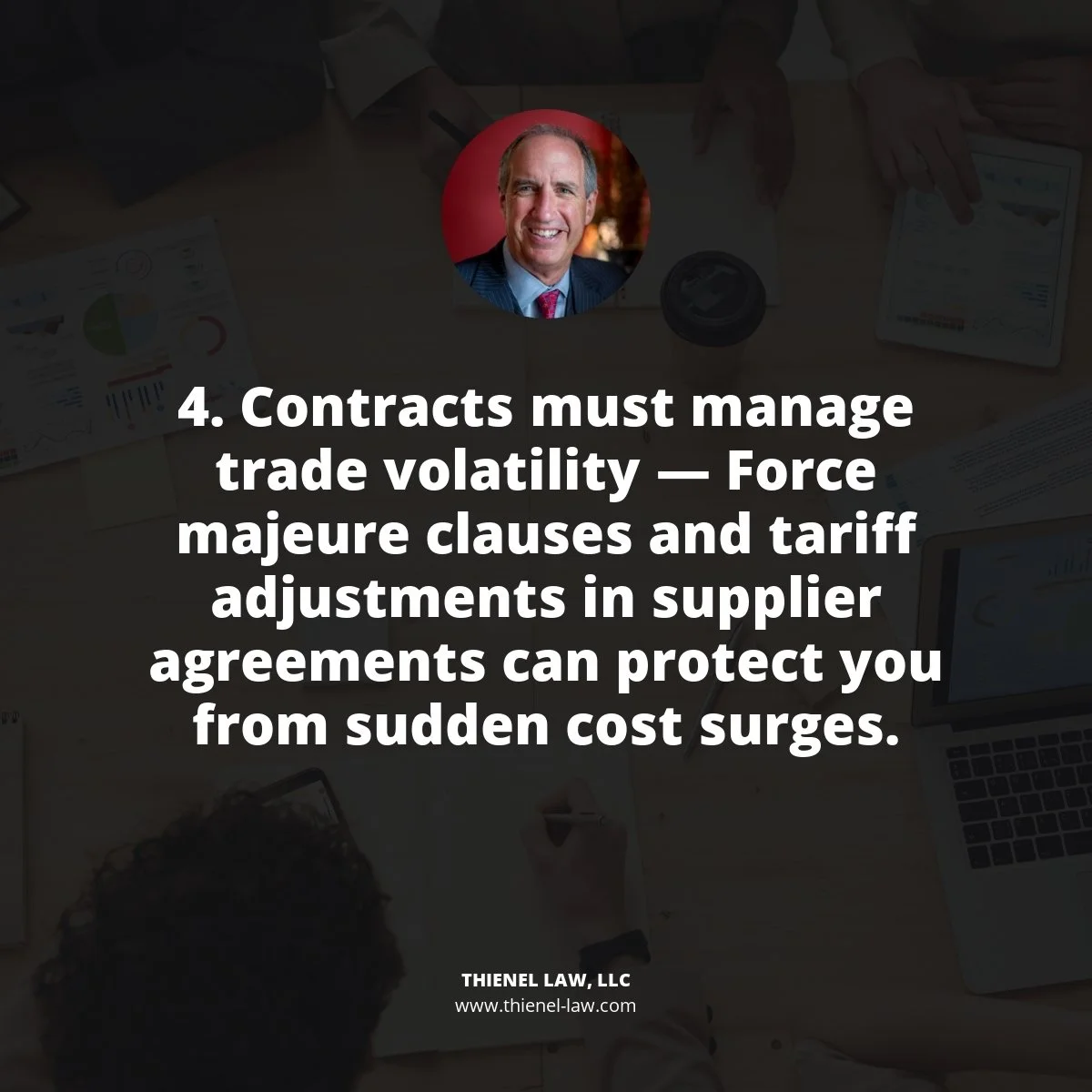Boosting Industry with One Hand, Hindering It with the Other: The Contradictions in U.S. Manufacturing Policy
Made in America? Navigating the Conflicting Signals of Tax Incentives and Trade Policy for DMV Manufacturers
Key Takeaways:
The new federal tax bill includes several provisions designed to encourage domestic manufacturing investment.
Simultaneously, ongoing trade policy decisions are increasing the cost of imported materials like steel and aluminum, raising operational costs for U.S.-based manufacturers.
Business owners in Maryland, Virginia, and D.C. face a balancing act between tax incentives and higher input costs when planning growth or expansion.
Entity structure — whether LLC, partnership, or S-Corp — can significantly affect how your business benefits (or struggles) under the new tax and trade landscape.
Proactive legal and tax planning is critical to optimize deductions, manage risk, and maintain competitive pricing.
Navigating the Push and Pull of Policy: What DMV Manufacturers Need to Know
For manufacturers and business owners in the DMV area — from aerospace firms in Northern Virginia to biotech manufacturers in Maryland — federal policy has entered an era of mixed signals. On one hand, tax reform is clearly designed to encourage investment in American production. On the other, volatile trade policies are making it more expensive to actually manufacture products in the U.S.
If you own or manage a business that relies on imported components or materials, or if you're planning capital improvements or equipment upgrades, these conflicting policies could significantly impact your cash flow, margins, and long-term strategy.
Here's a closer look at how business owners and high-net-worth individuals in Maryland, Virginia, and Washington, D.C. can interpret and respond to the current policy landscape.
Tax Law Is Favoring Domestic Investment — For Now
The administration's tax reform has put an unmistakable emphasis on domestic production and investment. Specific provisions aimed at boosting manufacturing include:
Enhanced accelerated depreciation on capital equipment — allowing businesses to deduct the full cost of certain machinery and improvements immediately.
A reduction in the corporate tax rate from 35% to 21%, improving after-tax profit potential for manufacturers.
Expanded qualified business income (QBI) deductions for pass-through entities like LLCs and S-Corporations engaged in eligible manufacturing activities.
All of these measures mean that, on paper, it's a favorable time to invest in new equipment, bring more operations in-house, or expand your domestic production footprint.
A Maryland-based tool-and-die manufacturer, for example, could immediately expense the costs of buying new automated metal-cutting machinery instead of depreciating it over several years. This offers significant upfront tax savings, freeing up working capital for hiring or additional investment.
However, these tax breaks don't exist in a vacuum.
Rising Input Costs Are Eroding Margins
Simultaneously, the administration's trade policies — particularly the imposition of tariffs on key manufacturing inputs such as steel, aluminum, and various electronic components — have raised the cost of doing business for U.S.-based manufacturers.
A Virginia-based defense contractor, for instance, might pay significantly more for alloyed materials imported from abroad to fulfill government contracts. When those cost increases can't be passed on to customers, profit margins suffer — neutralizing some of the benefits of lower tax rates.
This puts business owners in a difficult strategic position. Investing in domestic operations could unlock tax savings, but that investment might also be compromised by unpredictable material costs and trade restrictions.
For closely held businesses and family-owned manufacturing firms in the DMV area, where cost efficiency is critical to survival, this uncertainty can stall growth decisions and increase legal and financial risk if not carefully planned for.
Legal Entity Choice Matters More Than Ever
Under the current structure of tax law and trade policy, the type of business you operate can greatly affect your exposure — and your flexibility.
Let's look at a few examples:
An LLC or S-Corporation might benefit from the 20% QBI deduction under §199A, assuming it qualifies as a manufacturing business. But if supply chain constraints threaten output or margins, this deduction could be reduced or eliminated due to income limitations or phaseouts.
A C-Corporation, although now taxed at a flat 21% rate, doesn't get the QBI deduction. However, for companies intending to reinvest profits into the business rather than distribute them, the lower rate may still be advantageous — especially if capital expenditures will be large and ongoing.
Partnerships that include foreign investors or partners will need to pay careful attention to changes in international tax provisions and how tariff-related costs affect distributable income.
These nuances underscore the importance of aligning your operating structure with both your tax planning goals and your risk profile. For DMV-area businesses amid these policies, working with legal counsel who can provide integrated tax, business, and compliance advice is more critical now than ever.
Risk Management: Navigating Uncertainty in Trade Policy
Besides tax implications, there are significant operational risks to contend with. When trade rules shift without warning — as has happened with tariffs on Chinese electronics, Canadian steel, and beyond — businesses operating in sectors that rely on global supply chains must develop contingency plans.
This includes:
Reevaluating supplier contracts and trade agreements. Companies might need to renegotiate pricing or switch to domestic suppliers if costs rise too high.
Updating production schedules and warehousing strategies to accommodate delayed shipments or altered lead times.
Reviewing long-term lease agreements for warehouses or production facilities to ensure flexibility in case operations need to pivot.
It also means revisiting your commercial contracts. If you're not including specific language about force majeure, tariff pass-throughs, or material cost fluctuations, you could find yourself bearing the full burden of these price spikes — or facing breach claims.
A Maryland company importing molds from Europe for industrial manufacturing, for example, should ensure its purchase agreements have clear terms for how new tariffs would be handled — and what recourse exists if costs become prohibitive.
Strong legal frameworks can't eliminate trade risks. But they can limit exposure, preserve commercial relationships, and guard against litigation or regulatory surprises.
Estate Planning Considerations for Closely Held Manufacturers
For affluent individuals or families who own manufacturing businesses in the DMV region, policy uncertainty doesn't just affect operations — it touches estate planning and generational transition as well.
Suppose a Virginia-based owner is preparing to pass along part of a precision fabrication company to heirs. If trade policy continues to depress profits by driving up input costs, the value of the business — and any associated valuation discounts — could change substantially between the date of gifting and later estate tax planning.
Additionally, the new tax code provisions create generous latitude for gift and estate tax exemptions (currently over $13 million per individual), but business performance volatility may impact how and when such strategies should be executed.
Considerations such as:
Timing of gifting closely held business interests under Section 2701 or 2704
Creating grantor retained annuity trusts (GRATs) to take advantage of current low interest rates while managing valuation fluctuations
Using buy-sell agreements with clear pricing mechanisms that account for raw material inflation and trade risks
Each of these strategies depends on a stable business valuation — something destabilized by unpredictable tariffs and cost shifts. Estate plans should be reviewed often, and revised as necessary, to reflect real-time market conditions and tax law impacts on ownership interests.
Business Strategy in a Conflicted Climate
Manufacturing in the U.S. is a vital economic priority — one that current tax law undoubtedly supports. But when the supporting act of trade policy undercuts material inputs, it can leave even savvy business owners uncertain on how to proceed.
To thrive under this bifurcated policy environment, manufacturers in Maryland, D.C., and Virginia must:
Take full advantage of tax incentives while they remain in place
Closely monitor cost structures and supply-chain risks
Draft legal contracts with enough flexibility to respond to tariff shifts
Choose the right legal entity to maximize tax treatment under the law
Align business planning and estate strategies to ensure resilience
For many companies, getting this balance right is about more than compliance — it's about preserving competitive edge, sustaining growth, and protecting long-term wealth.
If You're Planning To Invest in Your Business, Start With the Right Advice
Business and tax policy are moving targets. That's why it's essential to operate from a clear, legally sound strategy that not only reduces risk, but also maximizes what's available under the law.
If you're unsure how recent changes in tax or trade policy apply to your business or personal situation, we're here to help. Schedule a consultation with Steve Thienel to get advice tailored to your goals and built to withstand shifting policy environments.
Request a strategy session today at Thienel Law — where business, tax, and estate planning work together for your success.






